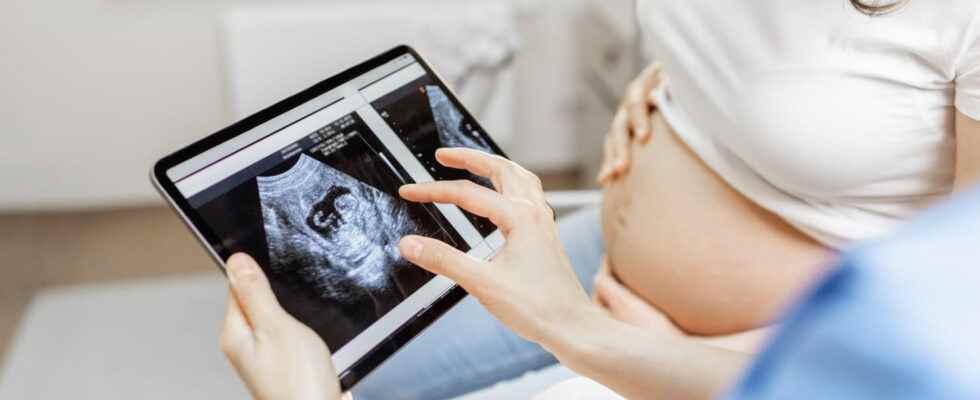Intrauterine pregnancy is the opposite of an ectopic pregnancy. It develops in the womb and is logically evolutionary. Definition, symptoms, complications… What you need to know about intrauterine pregnancy with the advice of Anh-Chi Ton, midwife.
Intrauterine pregnancy is a so-called “normal” pregnancy. In principle, the evolution of this pregnancy takes place without major problems for the mother-to-be and her baby, except if pregnancy complications are detected. What is an intrauterine pregnancy? What are the symptoms and risks? How do you know if it is scalable? Anh-Chi Ton, midwife, explains everything about intrauterine pregnancy.
What is an intrauterine pregnancy?
“An intrauterine pregnancy is a pregnancy that develops inside the uterus.“, explains Anh-Chi Ton. It is therefore a question ofa “normal” pregnancy where the embryo is implanted in the uterine cavity. In some cases, the doctor wishes make sure immediately after a positive pregnancy test that it is indeed an intrauterine pregnancy. This helps to check if there is a risk factor for ectopic pregnancy, if there is worrying bleeding or pain, and whether or not the pregnant woman wants to continue the pregnancy.
- To detect an intrauterine pregnancy, the doctor performs a ultrasound to check where the embryo is implanted and see how the pregnancy develops.
- A blood test may also be done to measure levels ofbeta-HCG pregnancy hormone and make sure the woman is pregnant.
What are the symptoms of an intrauterine pregnancy?
On the issue of symptoms of an intrauterine pregnancy, the midwife reminds us that they vary greatly from one woman to another. “There are the sympathetic signs of pregnancy like the absence of periods, but there is extreme fatigue, nausea, vomiting, tension in the breasts etc., explains Anh-Chi Ton. A pregnant woman may have all of these symptoms, while another may have none. Every pregnancy is different.
An intrauterine pregnancy is logically of favorable evolutionalthough of course problems can arise at any stage of pregnancy. There are several ways to ensure that a pregnancy is progressing well.. “From 5 weeks of amenorrhea (SA), we can locate the pregnancy on ultrasound and cardiac activity is visible around 6 or 7 SA“, details the midwife. If there is any doubt as to the progress of the pregnancy, several blood tests can be taken to measure the level of beta-HCG (chorionic gonadotropic hormone). “In the case of an ongoing pregnancy, the figure obtained must double every two days” in early pregnancy, says Anh-Chi Ton.
“In the case of an ongoing pregnancy, the level of beta-HCG should double every two days.”
What are the complications of an intrauterine pregnancy?
During a “normal” pregnancy, it is possible to encounter possible pregnancy complications like a ectopic pregnancyof the’high blood pressureA Gestational Diabetes or even a risk of premature delivery. These complications are detectable thanks to the various medical examinations that are to be carried out during pregnancy. Hence also the importance of pregnancy follow-up with a health professional. Of course, it is normal for the pregnant woman to have concerns, but there is no need to panic more than necessary. Do not hesitate to talk about your doubts and ask your questions, he will be able to answer you and allay your fears.
“When a pregnancy develops outside the uterus, most often in the fallopian tube, it is called an ectopic pregnancy. This is an unviable pregnancy that puts the woman’s life at risk“, explains the midwife. This is a medical emergency that requires rapid treatment.”Not only can the embryo not develop, but ectopic pregnancy can cause the fallopian tube to rupture“, she adds. Two examinations can confirm an ectopic pregnancy: the control of the beta hCG level and the ultrasound localization of the pregnancy. In the case of an ectopic pregnancy, the woman may have pain in the lower abdomen and/or light vaginal discharge. The only solution is therefore to terminate the pregnancy as soon as possible. before serious complications arise. “Management is most often surgical, although in some ectopic pregnancies detected early, drug treatment may be considered.“, also explains Anh-Chi Ton.
If the intrauterine pregnancy is confirmed by an ultrasound, there is very little chance that it will turn into an ectopic pregnancy. Except in women who have used medically assisted procreation techniques, this “which increases the risk of heterotopic pregnancy, although it remains rare in these patients”says Dr. Antonette T. Dulay, American obstetrician-gynecologist in an article published in the MSD Manual in October 2022.
Sources:
Ectopic pregnancy by Antonette T. Dulay. MSD Manual (October 2022)
Thanks to Anh-Chi Ton, midwife
